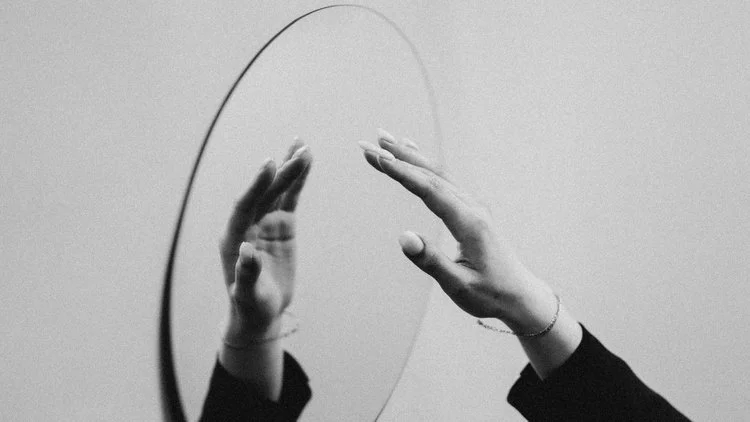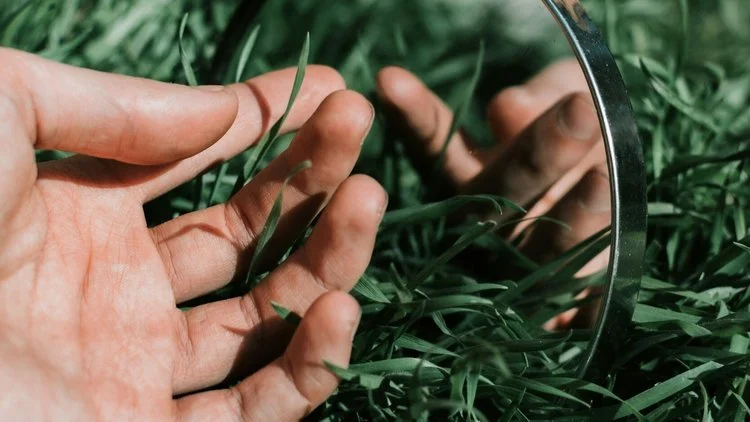Can mirroring help us become better listeners?
Floating, I’m floating on the water. My eleven-year old body stretched long. My face staring at the sky above me. For a second, I watch the clouds change shapes. The air smells of chlorine. The glub, glub of the pool water bounces against my partially submerged, bathing-cap covered head. I tilt my chin down towards my chest to see my sister facing me. We’re in 1960s matching one-piece navy-blue, white-pleated skirt swimming suits. Her legs extended straight too, our toes inches apart. We’re a mirror image of each other.
On a balmy late-sunsetting, summer night, music switches beats over the loud speakers. We each bend one knee and raise a leg to the sky. We try to keep in sync with the tempo and each other. Then slip below the surface. Underwater, the lights give off a rippling glow all around the pool. We perform to an adoring and forgiving public of family and friends. Everyone tolerant of our mishaps, and encouraging of our effort.
One of the home movies Dad filmed caught us practicing in the middle of open-swim at the pool. Mom sat on a cushioned lounge chair with two of my other sisters watching us. We’d practice for hours. Not sure how we simulated the music beats, maybe by counting or humming to ourselves.
Children mirror their parents, others adults, other kids. We all did growing up. As a way to practice a new skill or trying to fit in.
What is mirroring? Why do we mirror? How does mirroring help us be more present? Can mirroring make us better listeners?
what is mirroring?
In his article “Understanding Mirroring Psychology and Its Effect on Relationships,” psychotherapist Dr. John Crimmins explains mirroring psychology. As humans, we consciously or unconsciously replicate other people. Through another person’s behaviors, gestures, expressions, or speech patterns.
When someone waves at me, I wave. When I run or walk, I used to say hi when I passed people and many, if not most, had headphones on and couldn't hear me. But if I waved, even a small barely moving, flick of the wrist, hand-fan wave, people see the movement and I think instinctively wave back. And to my surprise, often there's a slight smile, a form of automatic social mirroring.
Mirroring can be a group endeavor too. Have you ever attended an NBA game when someone starts The Wave? Here in Portland at Blazer Games, I’d catch a synchronized movement from across the arena. Then wait for it, wait for it. Stand up, arms reaching for the sky, and sit back down with a grin. I’d watch the crowd continue the stand-up, arms extended, sit-down movement, hoping it’d make it all the way around again. No words exchanged. Maybe a nudge or two, or hands pointing in The Wave’s direction. The experience made me feel warm contentment in my chest. Silly maybe. But who doesn’t like to feel a part of something? Even a motion as insignificant and inconsequential as The Wave.
We mirror all the time: accents, body language, moods, and interests.
why do we mirror?
According to Clay Drinko, Ph.D., in How to Enjoy Playing With Your Children, “Humans are hardwired to mirror each other. Studies have shown that we unconsciously mirror people’s gestures and expressions. This is known as the chameleon effect.”
When our first daughter was born and Mom visited, she would sit with the baby swaddled in her lap facing her. One of the games she played was to stick the tip of her tongue out over and over again at the sleepy infant. Mom would play that game as long as it took for our daughter to stick her tiny pink tongue out too. As far as I know she did that for all fifteen of her grandkids. And dang if I didn’t see a picture of me doing the same thing with our new granddaughter last weekend.
Clay also explains how scientists have discovered we have mirror neurons, a complex neural system that unconsciously mirrors others. Imagine you’re watching someone else doing something like skipping down the sidewalk. Turns out that when we watch someone else doing something (like skipping down the sidewalk), motor neurons in the non-skipping person’s brain activate as if we are skipping too.
If I am the one mirroring, as with a grandchild, it feels like a secret game. The waiting for my granddaughter to figure out what grandma aka BB is doing. If I'm being imitated and don't realize it (so it takes me a while) the sensation feels like someone is talking behind my back. I’m being left out of the joke. As if all eyes are on me, waiting to laugh at me — mimicking doesn't feel good. Doesn't feel emotionally safe. But, if someone mirroring me to understand, reflect back what I'm saying, that's different. Then mirroring is validating or clarifying.
Mirroring comes naturally to us humans. We learn to establish connections and foster relationships with people when we imitate their actions, words, or emotions. Even if we are not conscious of our slight imitations.
how does mirroring help us be more present?
In this month’s thought echoes podcast, I spoke with Clay Drinko about using improv skills like mirroring. We talk about how mirroring affects our relationships, our mental health, and sense of self.
After reading Clay’s book Play Your Way Sane late last year when I researched how our brains respond “on improv,” I wanted to learn more. Since he has a 3- and 6-year old, I asked him what game I could play with my almost 3-year old granddaughter. He suggested the “Naming Game” - where you simply go on a walk and call things out without adjectives.
Easy for my granddaughter. Harder for me. Judgement slips in trying to be descriptive, but the activity instantly helped me focus on her and what we were encountering on our walk. A delightful game to be fully present.
In our podcast conversation Clay reflects of how watching himself on tape after an improv show, he was a different person. The best version of himself. The question of what exactly happens to us during improv, lingered for years before percolating back up for his dissertation. Clay developed a theory where he posits improv can “change your experience of what it is to be you.”
For Clay, improv shut down the distracting internal chatter so he could be present with his partner on stage. He wanted to make that happen in the rest of his life too. Hence his research and his book exploring the “intersection of improv, science, and the everyday.” He wanted to help make the world around him a better place through playing to be present.
can mirroring help us become better listeners?
Listening to Clay, when we mirror people, it’s really in two-parts. Matching energy levels, and doing what the other person does. When visiting my granddaughter this last weekend, we got to experience a bit of both.
Our granddaughter was amped up after day care. My normal reaction would be to try and “talk her down” or distract her. But instead, I took Clay’s advice and matched her energy. She came running with a craft project of a drawing of her dad on a paper plate attached to a popsicle stick. “Daddy! Daddy!” I took a pause and shook my hands out saying in a slightly less high-pitched voice, “Daddy! Daddy!” She stopped. Tilted her head at me. Smiled. Then ran back to her Lite-Brite game on her craft table.
The next day, she was fussing about getting ready for bed. She seems to like and respond to 5/3/2-minute warnings as I’ve seen her parents use. But there was an air of energy escalation hovering in the air. My husband started making goofy faces. No words. She stopped. Stood still and started mirroring his every move. Clearly delighted by the game and attention. A perfect moment of connection.
According to her mom. Martha Lauber a clinical psychologist, Jersey Griggs shares how mirroring is the best way to resolve an argument and how it saved her marriage. Not only does it force you to listen, rather than planning your counterargument. “Everyone thinks the other person is the problem. Mirroring helps you to understand you’re only seeing half of the picture.” Although we weren’t in an argument with our granddaughter, mirroring with both kids and adults can be an effective tool.
There are so many ways to use improv skills, especially mirroring, to enhance our relationships. Clay shares in the podcast, that as he learned to focus on other people and what’s going on with them, he's improving his mental health. And he feels more connected with others. .
***
Remembering back to that summer night during synchronized swimming with my sister, there was a warm sense of fun. Our sister connection echoes into the present. When we get together, decades later, I find myself matching her energy level and imitating her movements Even though I didn’t realize it until recently.
Imitation comes naturally to us humans. Mirroring each other is an entanglement dance of our thoughts turned into actions and movements. The echoes we initiate and repeat over time.
LEAVE YOUR COMMENTS BELOW.
If you enjoyed this post, I invite you to subscribe to my thought echoes newsletter.




